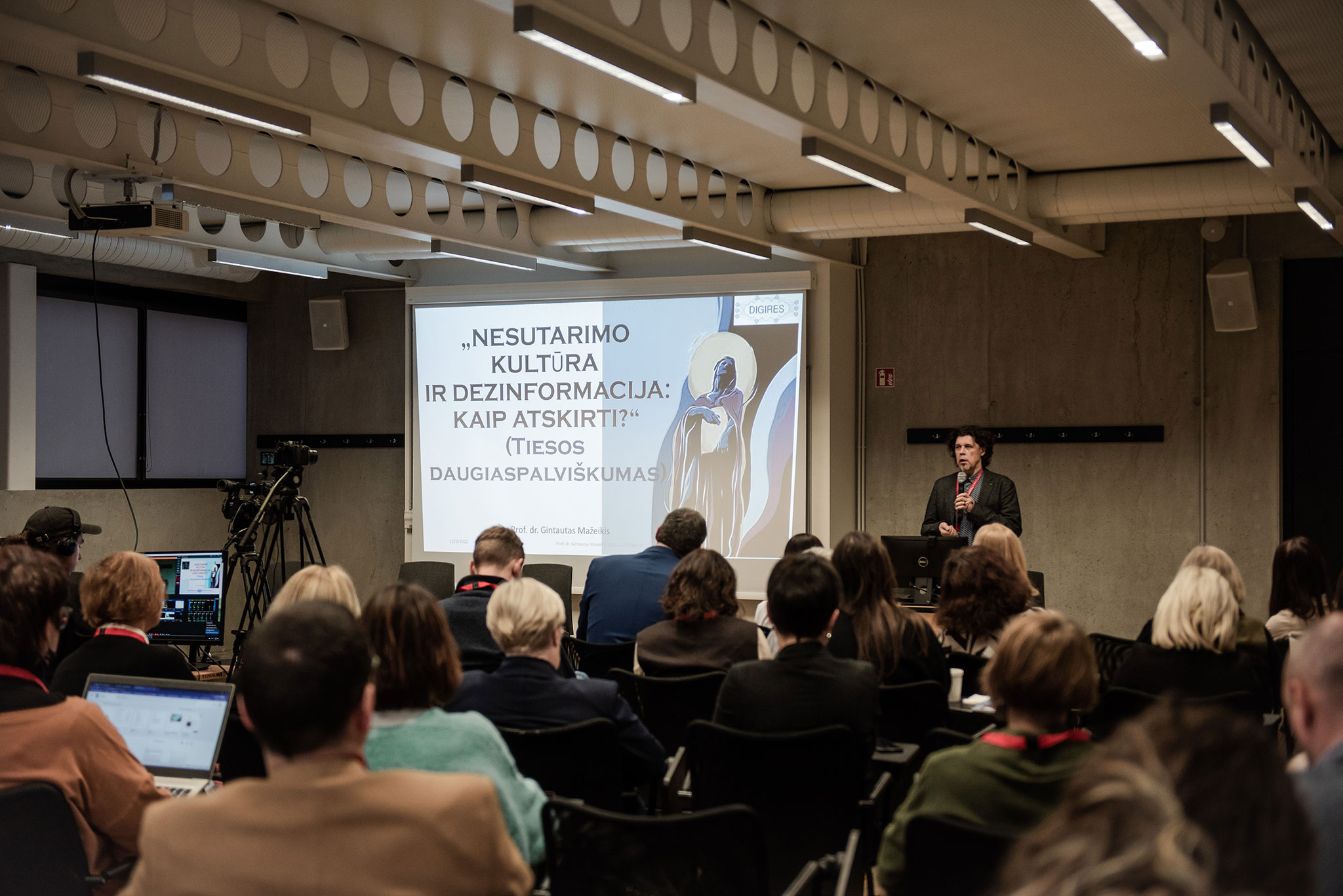 Back
Back

Starting December 2022, DIGIRES researchers and fact-checkers continue their activities in the newly launched BECID HUB network (BECID – Baltic Engagement Centre for Combatting Information Disorders), which aims to fight disinformation by bringing together experts from all three Baltic countries. Their collaboration will last for more than two years. BECID HUB will become a part of the European Digital Media Observatory (EDMO), a centre for combating disinformation in Europe. To fight disinformation, the network will use scientific research, fact-checking, and media literacy activities.
DIGIRES, which started as a pilot project in Lithuania in 2021, has already established close cooperation with the Nordic network NORDIS, which investigates disinformation. Very soon, DIGIRES and NORDIS will prepare and present joint guidelines, which will review the experience of Lithuania and Finland and will characterize the individual resilience of these two societies. Now DIGIRES is ready to transfer its unique experience in the development of digital resilience to Latvia and Estonia.
“It is very important to share experience in the region, in other Baltic countries, to test technological tools for checking facts, and to test innovative methods to investigate language saturated with lies. We dare to say that we have knowledge of how and what kind of false information and disinformation narratives circulate in the Lithuanian public space. What we don’t know, or know too little about, is how people react to it. Communication is a cultural act, which means that both the distributed digital content and the reactions of information users are determined by certain cultural-value reactions. Therefore, it is very important to study all this as accurately as possible, to understand the attitudes of information users and what determines the formation of such attitudes. This is the only way we will find out how and whom disinformation affects”, says Auksė Balčytienė, project manager and senior researcher.
According to the researcher, these issues will continue to be the focus of research activities of DIGIRES. At the same time, the project will aim to, first, ensure the effectiveness of fact-checking in the field of news media and second, to enhance media literacy by exchanging educational methodologies and real success cases on how to integrate media literacy into lifelong learning practices: from school to non-formal education classes for different age groups.
The emergence of this joint network in the Baltic countries was actively supported by government institutions, non-governmental organizations, and Lithuanian and foreign scientists, who pay great attention to the fight against disinformation. “DIGIRES has a really strong circle of supporters among government and non-governmental organizations,” says Balčytienė.
The Ministry of the Interior of the Republic of Lithuania made a significant contribution during the preparation of the first version of the project application, when Lithuania was at the epicentre of a new geopolitical issue, and it was necessary to respond quickly and decisively to hybrid attacks and the migrant crisis. The Ministry of Culture of the Republic of Lithuania, in support of the continuity of DIGIRES, through the activities of BECID HUB emphasized the need to create a media-friendly environment, to improve professional competences of journalists, and to analyse the issue of freedom of the press and legal measures to prevent disinformation. The project is also supported by the Ministry of Foreign Affairs – the interests of BECID HUB are closely related to the geopolitical issues concerning this Ministry. Cooperation and support was also received from the Strategic Communication Division of the Ministry of Interior of the Republic of Lithuania, which has been monitoring disinformation itself. Also, the Ministry of Economy and Innovation is actively addressing the progress of digital transformation, and everything related to how global platforms influence the creation and provision of safe communication will also discussed in the joint consortium of BECID HUB activities.
“The project is also supported by scientists from both Lithuania, especially Kaunas University of Technology, and from other countries. These include sociologists and representatives of political science, with whom we constantly work in various committees and councils dealing with study and science issues. Support was also received from organizations of the non-governmental sector: the Lithuanian National Commission for UNESCO, the Lithuanian Journalism Centre, the Vilnius Institute for Policy Analysis, and the Eastern Europe Studies Centre, whose activities respond to topical questions on how to achieve sustainable democracy through a civically-engaged society”, says Balčytienė.
Within one year, the DIGIRES team managed to gather an active network of researchers from Vytautas Magnus University (VMU), representatives of national (news portal “Delfi.lt”) and regional news media (“Tauragės kurjeris”), as well as active journalists and media educators. In addition, the network was expanded by associated partners from educational institutions, regional news media, libraries, health sector, and other fields.
During this time, DIGIRES prepared a methodology on training digital information source verification. Its practical sessions were attended by 90 third-year students of Public Communication at VMU. Later, the students passed on their knowledge to Kaunas high school students. In addition, several lectures on fact-checking were conducted to different professional groups, and recommendations for institutional partnerships at various levels were provided in hopes of a more active development of digital resilience activities.
The publication was prepared by Kristina Berksun, from Lithuanian to English translated by Aistė Turčinavičiūtė